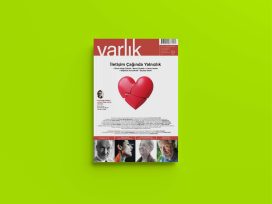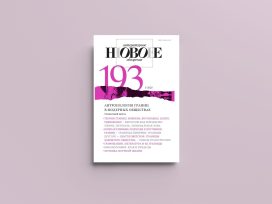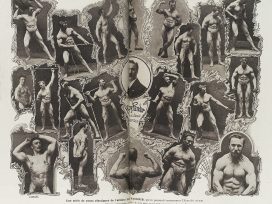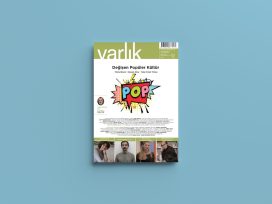
We are looking at something that probably not one of us has ever seen before. We are staring in perfect colour close-up at the slow, rhythmic uncoiling of a slimy proboscis. But what are we to make of the strange and oddly beautiful sight before our eyes? The camera pulls back a fraction. The answer is revealed. We are looking at a snail. A familiar garden snail. And as our recognition dawns, the background music, a gently impelling blend of harps and violins, fades slightly, and we hear the characteristic hushed intensity of one of the most famous voices in the world. “We don’t often see a snail that way”, says David Attenborough. “And that’s because we’ve only recently had the tiny lenses and electronic cameras we need to explain this miniature world.”
We are entering, burrowing into, the first part of Attenborough’s most recent BBC series, Life in the Undergrowth: by the time the five episodes are over another four hours of screen time will have been added to the ninety or so hours of extraordinary television footage that he and his various teams have compiled for television viewers over the last 30 years.
But although what we are seeing may be microscopically novel, it is embedded within a thoroughly familiar set of conventions. We can be certain, for example, that David will be drawing helpful analogies between what we are seeing and our own human behaviour. This miniature world may be strange but, as he quickly reassures us, “When we meet its inhabitants, we suddenly realise that their behaviour can be just as meaningful to us as the behaviour of many animals more our own size.” We also know that in a moment the screen will be filled with the large, comforting, increasingly avuncular figure of David himself. On this occasion we discover him lying on his side with his lower half covered by green foliage. “Look at this, for example,” he enthuses, extending a giant finger towards the camera until it touches the wriggling bronze creature in the immediate foreground. “It’s an earwig.” He pauses as though allowing our repulsion a moment to recede. “Yes, but it’s also a female and a mother. And like so many mothers, she’s guarding her young.”
Don’t like earwigs? No matter. Within seconds we cut to a close-up of two ants. What are we to make of their convoluted movements? “These two ants,” David tells us, “are not really sure if they like one another. Stroking antennae is the equivalent of a cautious chat over the garden fence.”
Within no more that three minutes we have been introduced to the reasons why Attenborough’s programmes have attracted such massive audiences around the world, as well as the reasons why they have sometimes failed to endear themselves to a disparate mixture of academics and intellectuals.
When I carried out some research a few years ago into what made Attenborough’s programmes (Life on Earth, Life in the Freezer, The Private Life of Plants, The Life of Birds, The Living Planet) so popular with general viewers, I was told repeatedly that the “best thing” about them was not the wonders of the photography, or the insights into previously unknown worlds, but the feeling that Attenborough was genuinely excited about what he discovered. In a medium otherwise saturated with bogus enthusiasm, he was, I kept being told, the genuine article. He did what he did because he could do no other. He was, in common with such other stalwarts of popular science on television as Patrick Moore and Bill Oddie, that most admired of all British public figures, the passionate amateur.
But this is precisely the reason why some of his more high-minded critics find it easy to resist his charms. He may indeed be showing us some of the previously unseen wonders of nature, but does he need to do so in a manner that leans so heavily upon human analogies? Why can’t we be allowed to appreciate the intrinsic interest of ant behaviour without being seduced into that appreciation by the suggestion that they are conducting the equivalent of “a cautious chat over the garden fence”? I’ve even heard extremely strict-minded academics complain that it is misleading or dangerously anthropomorphic to use such emotionally resonant terms as “child” or “mother” to describe the sights before our eyes. “They’re not baby spiders,” one academic explained to me with some exasperation. “They’re young spiders.”
This always sounded to me like little more than professional jealousy, a refusal to recognise the manner in which Attenborough has given scientific credibility to the television depiction of nature. It is easily forgotten that when he first started out on his long journey he had to make a radical break from nearly all the previous attempts to place the natural world on television. He had to abandon the cute, often zoo-based programmes in which animals were little more than comic or weird sideshows in the real business of human life, in favour of a format which wholly respected their integrity. The lives led by Attenborough’s creatures may have some analogies with human comings and goings bestowed upon them, but they are always presented as intrinsically interesting.
However, this respect for the integrity of animals may paradoxically be the reason why it is not uncommon to find intellectuals and academics with little more than grudging respect for Attenborough’s achievements. A close colleague who has written with the utmost sensitivity about human emotions and motivation told me, when I enquired about his interest in Attenborough’s programmes, that although he had certainly seen “a few of them” he found them less than fascinating because they were only about animals. They had nothing to say of sociological or philosophical import.
When I talked to Attenborough himself in his Richmond home about such an attitude he recognised it immediately. He told me he had often met such people at dinner parties and elsewhere. What they were really complaining about was that animals failed to throw any light on their own behaviour. This, as far as he was concerned, was the very worst example of egocentrism. It was tantamount to suggesting that the only point of animals was to act as some sort of resource for humans, a bestial stockroom that could occasionally be raided for exemplars whenever we were in need of proof of our own distinctiveness or superiority.
I gently suggested to him that he might have contributed to this critical view by the rigorous way in which he airbrushed human beings from his landscapes, by the manner in which he excluded any reference to the social, political and economic context which surrounded the animals in the centre of his frame. He explained that this had been a quite conscious decision. In his early work he had explicitly talked about human behaviour in such series as The Tribal Eye but he had reluctantly come to the conclusion that programmes devoted to the life and rituals of particular tribes could easily become repetitive. There was not enough difference to command continuous attention.
Nor was it any lack of intellectual interest in human behaviour that had led him to concentrate so single-mindedly upon animals. He had, he revealed, a lifelong interest in anthropology. In his youth, he had studied the subject at the LSE under such an eminent scholar as Raymond Firth. He was, he also happily admitted, a great admirer of the writing of that microscopic observer of human ritual, Erving Goffman. But when he was confronted by the general human ignorance of the amazing beauty and diversity of the natural world, when he felt “enthralled almost to the point of ecstasy” by his own observations, he knew that he could have no other mission in life than spreading news of that beauty and diversity to as many people as possible.
I suggested to him that this endeavour had had one slightly unexpected consequence. For although he had never made any bones about his own wholehearted subscription to the Darwinian account of the origins of this diversity, there had been those who used his “ecstatic” revelations to bolster arguments for intelligent design, to suggest that so much beauty and variety could not have arisen purely as the result of blind purposeless adaptation. One sociologist has even suggested that ambitious, expensive and widely viewed programmes such as Attenborough’s are so committed to the “wonders of nature” brief that they are almost bound to imply that there is some intentionality at work in evolution.
Attenborough will just about admit that a script which says that “an ant-eater has a long tongue so that it can eat ants” can be interpreted as suggesting intelligent design, but maintains that there is quite enough elsewhere in the programmes to show that this is patently not what is meant. And indeed even a casual viewing of a series like Life in the Undergrowth shows the extent of his evolutionary commitment. He consistently picks out species that take a particular adaptation or behaviour to an extreme as well as showing the general direction of the species’ evolution. You can certainly watch for the pretty pictures, but Attenborough’s words nearly always make it abundantly clear that what is so wondrous about nature is not, say, the plumage of the bird of paradise, but the fact that this plumage had an adaptive function, that accident produced such an extraordinary display.
He told me that he had been so pestered by those who saw a divine pattern in nature that he had now developed a stock response. “I tell them they ought occasionally to think less of beautiful things like hummingbirds and orchids and sunflowers and think of other, less attractive things. They might, for example, think of the parasitic worms that live only in the eyeballs of human beings. Think of that worm boring its way through the eye of a boy sitting on the bank of a river in West Africa. A worm that’s going to make him blind. Are you telling me that God or an intelligent designer created this worm that can live in no other way than in an innocent child’s eyeball?”
He’d also been around long enough to remember other occasions when an overwhelming sense of wonder had prompted previous incarnations of the ID argument. “When we discovered this tiny little thing called a gene which carried the blueprint of a human being, there were those who said, how could such a complex matter be carried by such a thing? It must be designed. And now we know from work on the structure of DNA exactly how it happens.”
Yet he had never openly declared himself to be an atheist. “That’s right. I’m an agnostic. In the strict sense that I don’t know. And I don’t know a lot. And I certainly don’t know about the existence of a supreme being or about the existence of an afterlife. The absence of evidence does not mean that there is a god. The absence of evidence means two things. It means that we don’t know, but it also means scientifically that it would be interesting to find out.” There are those who accuse agnostics of hedging their bets. But this would be quite unfair to Attenborough. His agnosticism is not a way of saying that there might be a god; it is rather a statement about the necessary humility and open-mindedness of the scientific attitude. It is a prescription for action rather than a refusal to enter the argument.
When I pressed him about religion in his childhood he admitted to singing hymns but never for a moment believing in the divine philosophy they sought to purvey. Where was the evidence?
His concern with evidence – there is probably no word that features as heavily in his conversation – means that he is thoroughly up to date with the new debates in the field of Evo-Devo, debates about the manner in which the evolution of complex new forms, rather than requiring a succession of new mutations and new genes, may be accomplished through changes in already existing genes. He describes this as “fascinating and exciting” and in no way evidence that it might now be the time to doubt the potency of Darwinian theory.
But when I suggest that his detailed knowledge of such advances goes way beyond that required for the presentation of his programmes, he quickly backtracks. “No, I’m not a scientist,” he insists. “I have made no discoveries, although there are some in my teams who might be able to make that claim.” Any ideas that he might follow in his father’s footsteps and become an academic scientist were knocked out of him long ago when he attended a seminar on x-ray crystallography and realised half-way through that he couldn’t follow, simply couldn’t do it. He might accept that he had the gift of scientific curiosity, but this was by no means enough. “You need directed curiosity. You need, say, a knowledgeable ornithologist by your side.” The problem with television, he says, is that “because you appear on it, people actually think you know what you’re talking about.”
I’d expected this answer. It is consistent with what he’s said before about his role in the making of the series. He doesn’t wish to present himself as a scientist, nor does he wish to fall for any of the usual blandishments of celebrity. He tells me that he learned quite enough about the absurd workings of the celebrity business when he was Controller of BBC 2 from 1965 to 1969, and then BBC Television’s Director of Programmes from 1969 to 1972. “All those people who believed they were stars because they had a picture in the Radio Times.” He is also fond of telling the self-deprecating story about being stopped in the street by someone who wanted to sing his praises. The stranger rattled on and on about his sincere admiration and then said by way of conclusion, “Do you know, the best thing you ever done was that Ghandi!”
Some years ago, the writer and television presenter Robert Robinson suggested a simple way to distinguish between those people in the public eye who enjoyed a genuine reputation and those who had merely acquired celebrity. All one had to ask was whether the person in question would be diminished by an appearance in a commercial. Would our current opinion of the worth of Alan Titchmarsh or Gordon Ramsay or Nigella Lawson need to be dramatically revised if they appeared on our screens tomorrow flogging baked beans or after-dinner mints? Hardly. But imagine the extent of the character revision we’d have to make if Attenborough popped up in a similar role. It’s this general recognition that he is simultaneously one of our best-known television figures and someone who is not part of the general pack of circulating nonentities who crowd the late-night chat-show sofas that, in a recent Reader’s Digest poll, earned Attenborough the oddly paradoxical title of “Britain’s Most Trusted Celebrity”. Whoever thought, before Attenborough provided us with a benchmark, that celebrities could be so calibrated?
There are some who argue that Attenborough might have made more use of his exalted status. Why, for example, hasn’t he been bolder in his denunciation of the creationists? He explains that he did indeed make a statement back in 2002 opposing the teaching of creationism in state schools, and more recently registered a strong protest when he discovered that a Dutch evangelical TV channel which had bought the Life of Mammals series had doctored the beginning of the first part so as to exclude his opening statement: “We will look at the lives of our closest relatives. And they will lead us to ourselves. Perhaps the most successful variation of the mammal’s winning design.”
He’s also been gently criticized for not embracing the environmental movement more wholeheartedly. But when I raise the issue, he points me to his closing message in State of the Planet: “The future of life on earth depends on our ability to take action … real success can only come if there’s a change in our societies and our economics and in our politics … we have a responsibility to leave for future generations a planet that is healthy, inhabitable by all species.” Surely that was clear enough?
It’s easy to feel after even the most affable of conversations with Attenborough that you’ve failed to gain any great new insight into his character. He would himself be happy with that outcome. He tells me that he has no interest in introspection. “I don’t want to learn about myself. I know quite enough about myself already, thank you very much.” Would he ever consider talking about his life to an analyst or a therapist? “No. I wouldn’t want to do that.”
Although I don’t press the point, I get the feeling that he regards our contemporary passion for self-examination as one of the reasons for our failure to appreciate the complexity of the natural world. If only we would all sit up a little bit straighter and look at the huge wonders before our eyes instead of interminably scrabbling around within our own psyches.
And there certainly is a strong element of self-mastery in Attenborough’s approach to life. He has not slipped into his public role. At every stage of his fifty-year career he appears to have carefully calculated the direction he wished to take. If the natural world is going to be presented on television then it must concentrate on the animals themselves and not be distracted by the social and cultural contexts which surround them. It must eschew too much anthropomorphism but allow just enough to retain the viewers’ interest. It must admit a degree of self-presentation but never topple over into celebrity-worship. It must be scientifically accurate without ever suggesting that Attenborough himself is a professional scientist.
Some of these choices have meant that the “Attenborough” we know so well from the television is a diminished version of the man himself, a version which does not do justice to the range of his anthropological knowledge, to his full scientific intelligence, to his strong belief in a morality based upon mutual tolerance, to his delightful sense of humour, or to his passionate belief in the sense of transcendence that can be acquired from classical music.
As I’m leaving I tell him that Steve Jones recently selected the full DVD set of his television series as the most suitable present to hand to Darwin were he to return to Earth.
When I looked back from the garden path I was delighted to see that he was still savouring the compliment.







